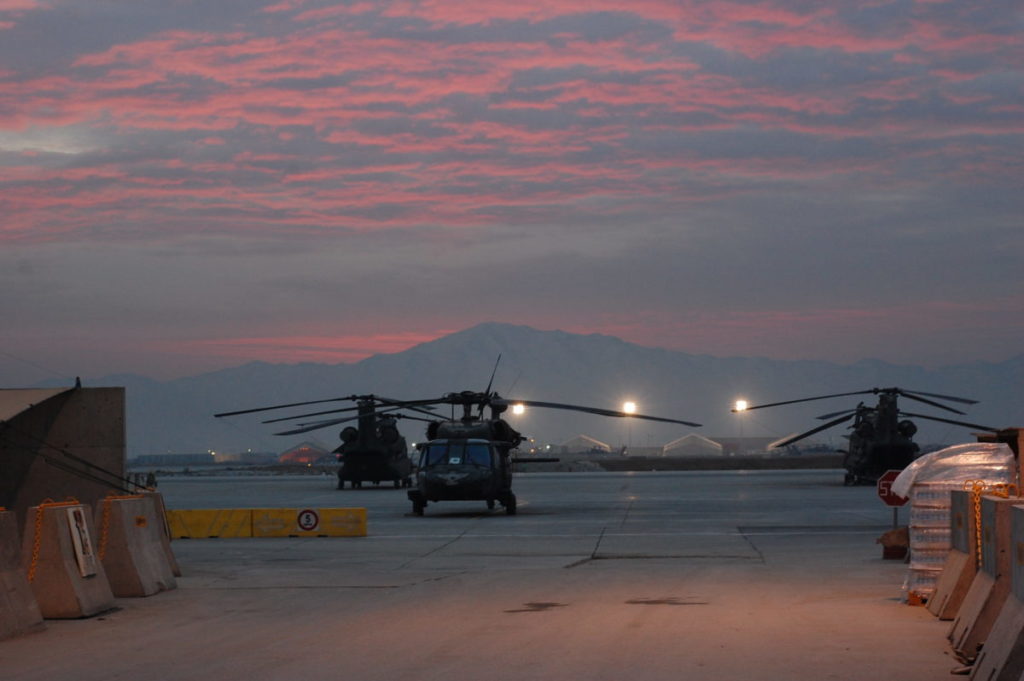On Aug. 30, 2021, the United States Armed Forces withdrew the last of its troops from Afghanistan, signifying the end of a military occupation that had spanned almost twenty years. Witness testimonies of that fateful day illustrate a harrowing scene: Afghan civilians running alongside planes in a desperate attempt to escape the country, chaos erupting in the Kabul airport, and a panoramic tide of uncertainty enveloping the nation. Orders for the final stages of withdrawal to be completed were issued after the Taliban seized the presidential palace in Kabul on Aug. 15.
President Joe Biden explained the rationale behind the withdrawal by invoking the supposed initial goals of the invasion in 2001. “We went for two reasons. One, to bring Osama bin Laden to the gates of hell, as I said at the time,” Biden stated at a White House press conference. “The second reason was to eliminate al-Qaeda’s capacity to deal with more attacks on the United States (U.S.) from that territory. We accomplished both of those objectives, period… that job had been over for some time.”
Since then, the people of Afghanistan have faced a nationwide famine, exacerbated by international economic sanctions. Additionally, women’s rights have rapidly deteriorated, as the Taliban has passed laws that prohibit women from working in non-governmental organizations, receiving secondary education, and participating in many avenues of public life. This fundamentalist regime is extremely reminiscent of the Taliban’s previous rule; beginning in 1996 after the Taliban emerged victorious from a series of civil wars and preceded by a U.S.-backed rebel campaign in the 1980s that drove out the Soviets. Which begs the question: with that return to status quo, what did the U.S. accomplish with the War in Afghanistan? Furthermore, was it worth the loss of tens of thousands of civilian lives in the process?
Zero Units
In 2018, three years preceding the Taliban’s seizure of Kabul, Afghan journalist Lynzy Billing cataloged hundreds of missions conducted by Zero Unit militias, which are “squadrons of U.S.-trained Afghan special forces soldiers.” Regarding her research, she remarks, “…even the raids that did end in the capture or killing of known militants frequently also involved civilian casualties…I found the Zero Unit soldiers acted on flawed intelligence and mowed down men, women and children, some as young as 2, who had no discernible connection to terrorist groups.”
What Billing discovered during her time in Afghanistan paints a clear picture of a secretive, highly militaristic operation carefully designed to avoid association with the U.S. military. Instead, in seeming compliance with U.S. human rights law, the program fell under the jurisdiction of U.S. intelligence – specifically, the Central Intelligence Agency (CIA). Referred to internally as “the Mohawks,” an Afghan paramilitary known better as “Zero Units” was funded, trained, and allegedly accompanied on missions by the CIA.
This proxy force served U.S. military interests all throughout Afghanistan, fighting Bush’s “War on Terror” almost two decades after its inception. Clashes with the now-regnant Taliban, al-Qaeda, and other Islamist designated terrorist groups were common. But, as Billing writes in ProPublica, the Zero Units often found civilian countrymen in their crosshairs. Baseer, an Afghan soldier in the “02” Unit, was quoted as saying, “They are Americans killing Afghans, but we are Afghans killing Afghans. But I know Americans do not lie awake at night with the guilt I have.”
Particularly characteristic of the Zero Units were their “night raids” – operations conducted after dark that often involved sweeping civilian communities for insurgents. Billing documented dozens of raids by the 02 Unit, operating in eastern Afghanistan. Storming through villages indifferent to fatalities in their wake, the CIA-backed 02 Unit made a terrifying name for itself in the area surrounding the city of Jalalabad. Five teachers shot and killed in Chaparhar district, posthumously designated as ISIS militants to justify the slaughter. Eleven casualties after a raid in Khogyani district, including another teacher; families like that of Batour, a university student whose two brothers were among the dead, were left broken and hopeless. As one Afghan woman told Billing, “Not once did I think… that any Afghan official, court or anyone would believe me.”
Although Mujib Mashal at The New York Times reported on the Zero Units in 2018, coverage since then has waned, limited mostly to The Intercept and ProPublica. It’s unsurprising, considering the secretive, skulking nature of the operation, not to mention its CIA affiliation. But, after in-depth research, what those three sources agree on is this: Zero Unit operations, whether genuinely intended to reduce regional terrorism or not, have contributed to a polar effect. Afghans like Batour that were once neutral, opposed to the Taliban, or even sympathetic to their government and the U.S. intervention, could not be repulsed more easily than by losing family members to a CIA-backed militia of their own compatriots. Similar to how those wronged by the U.S. have sought refuge with geopolitical adversaries, the Taliban might have found a fervid new base of support in victims of American proxy violence.
Jus In Bello
In attempting to achieve its geopolitical ambitions, the U.S. has long attracted accusations of violating international humanitarian law, especially during the 20th century. Far from modernly bygone, however, these claims have been applied to the last four federal administrations; military operations under former presidents W. Bush, Obama, Trump, and President Biden have been censured by human rights groups like Amnesty International. In the case of Afghanistan, the legality of Bush’s initial invasion and following occupation of the country has been heavily scrutinized.

Though arguably not as egregious as the leadup to the Iraq War (specifically, Colin Powell’s specious “weapons of mass destruction” excuse to the United Nations), the American argument for the intercontinental invasion of Afghanistan as “self-defense” is not unworthy of skepticism. Even more alarming is the sky-high collateral damage dealt to a nation that, under current Taliban rule, finds itself in a situation not politically distant from over twenty years ago, when the U.S. chose to oust the Islamist group initially. As The Guardian’s Julian Borger asks, “what was it all for?”
Billing’s research in eastern Afghanistan produced a grim tally: “at least 452 civilians killed” just by the regional 02 Unit. She calls that number “an undercount”, due to an inability to differentiate deceased militants and civilians, or intentional confusion between the two in the field. Such a toll is devastating by itself, but without similar documentation on “01” and “03” Units, operating in central and southern Afghanistan respectively, the true total is left to woeful speculation.
This in mind, it’s not difficult to grasp why the U.S. would want to carefully distance itself from the actions of Zero Units. Making this easier is the lack of U.S. military association with the proxy force; they instead fell under the jurisdiction of the CIA in what Billing calls a “legal loophole” – Leahy Law. But as Yasin Zia, formerly Afghanistan’s Chief of Army Staff, tells The Intercept, “…their salary was paid by Americans, their targets were given by Americans, and until the end the Americans were with these units.”
Leahy Law Explained
The Zero Units were able to conduct these violent night raids for years without accountability because of a crucial ambiguity within pertaining legislation. Leahy Law, according to the U.S. State Department, refers to “two statutory provisions prohibiting the U.S. Government from using funds for assistance to units of foreign security forces where there is credible information implicating that unit in the commission of gross violations of human rights (GVHR).”
The equivocation of Leahy Law lies in its sole application to the Department of State and the Department of Defense – its jurisdiction does not extend beyond these two executive departments. This, Billing maintains, is the reason as to why the Zero Unit militias were overseen, trained, and funded by the CIA.
The activities of intelligence agencies are supervised, to some extent, by congressional committees. If ordered, intelligence agencies are legally obligated to detail their activities with military forces abroad, as per Title 50 of the United States Code. Section 3091 of Title 50 states that the executive branch must make certain that congressional committees are frequently informed of intelligence activities. This requires that “the President must notify Congress of all covert actions and significant clandestine activities of the Intelligence Community (IC).” However, according to anonymous congressional staffers who spoke to ProPublica, congressional committees are oftentimes poorly equipped to thoroughly track the campaigns of clandestine operations in foreign countries. This, as Billing maintains, contributed to the operational circumstances that made “the lines of accountability so obscured that no one had to answer publicly for operations that went wrong.”
“Like Nothing”
Any shock that comes with learning of governmental misdeeds often seems to lessen with familial proximity to the issue. “I’m genuinely not surprised,” said Sahar Nabizai, an Afghan woman speaking to us from suburban Seattle. “Power is what [the U.S. government] wants, and they’d get it with any means possible.”
Seeking personal insight, we posed the earlier overarching question: did the war in Afghanistan accomplish anything worth its heavy cost? Sahar replied, “A lot of my family lives there now. They’ve been there when the U.S. was there and they’re still there with the Taliban… when the U.S. was there, it was positive in that there was a little more freedom, negative that the U.S. treated my home like nothing.”









Be First to Comment